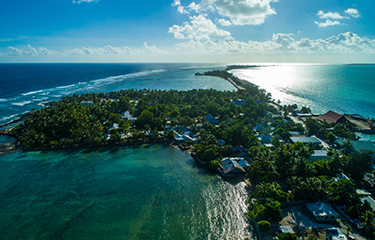The death of Kiribati fishery observer Eritara Aati Kaierua is prompting calls for reforms to fishery observer programs in the Pacific.
Kaierua was found dead aboard the Win Far No. 636, which is flagged to Taiwan, as the vessel was enroute to the Tarawa port of Kiribati, according to the initial notice from Taiwan sent to members of the Western and Central Pacific Fisheries Commission (WCPFC), the Kiribati observer program, and multiple Taiwanese officials in early March.
Kaierua was 40 years old and leaves behind a wife and four children between the ages of 1 and 11.
The Association of Professional Observers has been able to piece together some information and is communicating with Kaierua's family and Kiribati investigators to try to confirm details about Kaierua's death and the investigation. He appears to have died from a blow to the back of the head.
"In general, I think the family is not really satisfied with the information they're getting from the authorities,” Association of Professional Observers President Liz Mitchell told SeafoodSource. “It's really important for these observer programs to fully inform the family members of how their loved one died."
Kiribati Police Commissioner Ioeru Tokantetaake confirmed for SeafoodSource that his agency is investigating Kaierua's death, but said he can only release information after the investigation comes to an end. Mitchell said that the Kiribati police are treating the investigation as a murder investigation.
The Association of Professional Observers has documented the death or disappearance of one to two observers every year since 2015, when they started collecting records.
Observers face challenging dynamics aboard vessels as they witness and document vessel activities for scientific and enforcement purposes. Their job can pit them against captains and crew if illegal or dubious activities unfold, such as illegal fishing, drug trafficking, or shark finning. The role is even harder if observers don't speak the same language as the captain or vessel crew members.
"There's inherent pressure because you're going on a vessel and you know what you're going to collect could possibly make you all of a sudden alone," Mitchell said. "You walk in with the realization that you hope you don't see anything because it automatically creates tension."
In 2015, the WCPFC, which oversees the region where Kaierua died, changed minimum standards for the regional observer programs, requiring a two-way communication device so that observers don't have to go through vessel captains to communicate with shore-based operators, Mitchell said. And in December 2017, the WCPFC passed an observer safety measure.
But Mitchell doubts that Kiribati observers actually have those two-way devices, and said that the WCPFC needs to review its observer programs more frequently to develop better protections for observers.
Automatic Identification System (AIS) vessel tracking technology was turned off after Kaierua boarded on 13 February and the vessel left port. It’s unknown where the vessel was from that time until the notification came from Taiwan in early March.
"What investigators need to do is to verify the points at which the vessel left a certain territory and look at all that stuff and compare it to the observer's notes that they're sending from the boat," Mitchell said.
Kaierua’s sister, Nicky Kaierua, told the New Zealand news outlet Stuff that Kaierua feared for his life after an incident last year in which a vessel was forced to offload tons of tuna in Tuvalu after officials found that the captain’s log differed from his own. But he continued working.
"The system appears to lack safety risk management. Had there been a robust and effective system with a good reporting, lives could have been more protected and accidents could have been prevented," Nicky Kaierua told Stuff.
Disappearances of observers were rare in years past, according to Simione Cagilaba, a former fishery observer in the South Pacific and a board member for the Association of Professional Observers. He attributes the rise in incidents to an overall increase in fishing in the South Pacific, especially by Chinese and Taiwanese companies.
"This was unheard of in the late 1990s when I started observing. For observers to disappear or just simply die, this was unheard of when we started as observers," Cagilaba told SeafoodSource. "I believe this is mainly due to the number of boats that are now fishing in the Pacific. It's way more than what we used to observe up there back in the 1990s. Now if you go up there it's like a city. You can see lights all over."
Observers have few protections, Caligaba said. Rules require captains to allow observers to work freely, but enforcement of those protections is up to captains and crews.
"I believe that they disappear, or they do die, many for the reason that they have witnessed something," Caligaba said. "What they witnessed would certainly put the vessel in trouble and that's why they have to be silenced. Observer work is really getting dangerous."
There's no standard operating procedure for investigating an observer death, and jurisdictional responsibilities are murky. The investigation into Kaierua’s death appears to be hitting a brick wall, said Caligaba, who is a trained criminal investigator.
If Caligaba were investigating the incident, he would take a few steps immediately.
To find out where the crime was committed — and in which jurisdiction — he would secure logbooks, the track plotter, and paper and digital navigation charts. He would also secure CCTV records to see when the observer was last seen alive, then compare that date to the logbook location information and VMS records. He would go through the observer's logbooks and entries to see if any of the notes rendered clues. He would identify witnesses and separate them, and try to reconstruct the scene and identify a murder weapon.
Caligaba figures Kiribati investigators have probably taken only some of those steps.
"I doubt it that they have done all, because if they did, they should have wrapped up the case by now," Caligaba said.
Photo courtesy of Kyung Muk Lim







